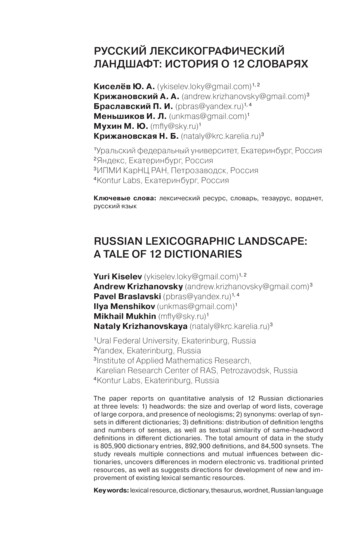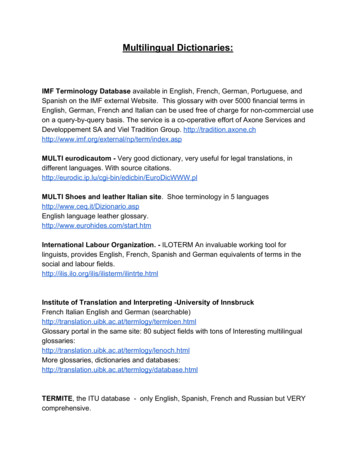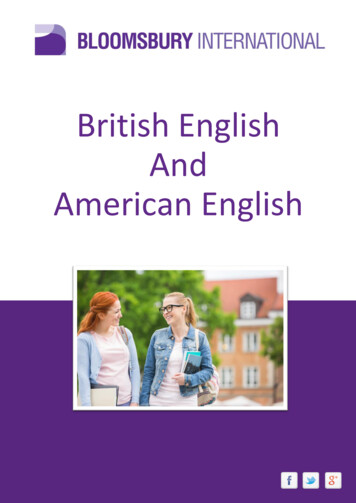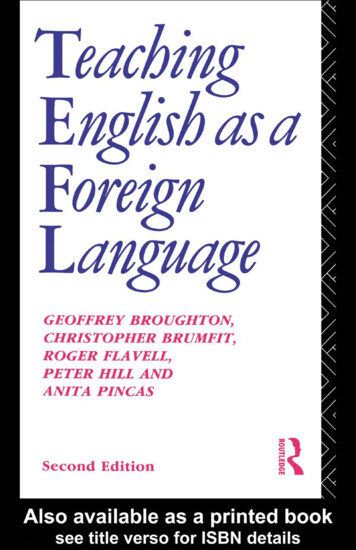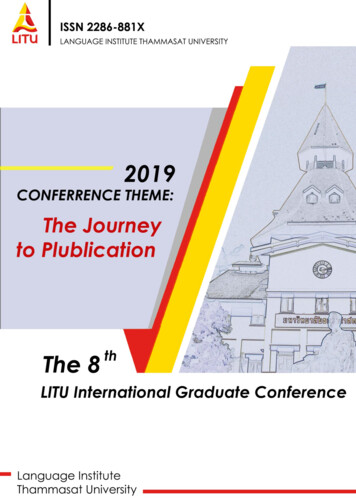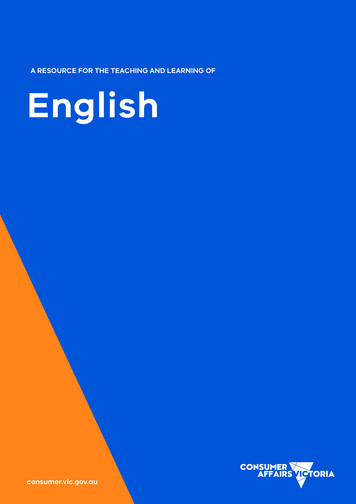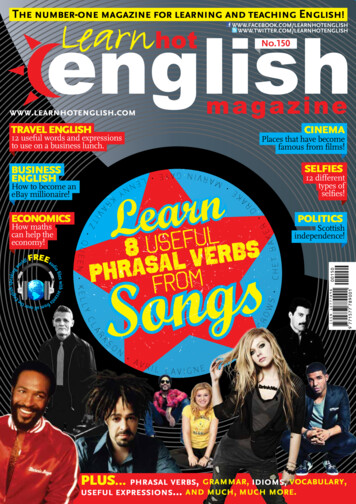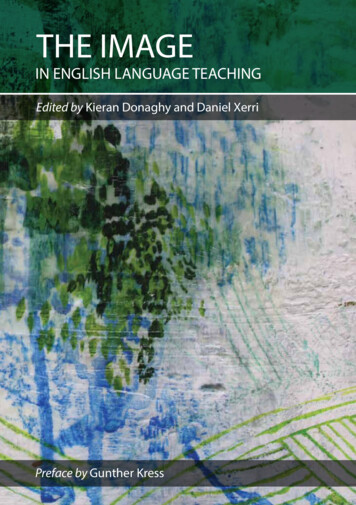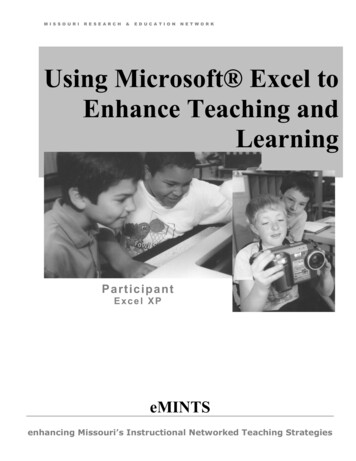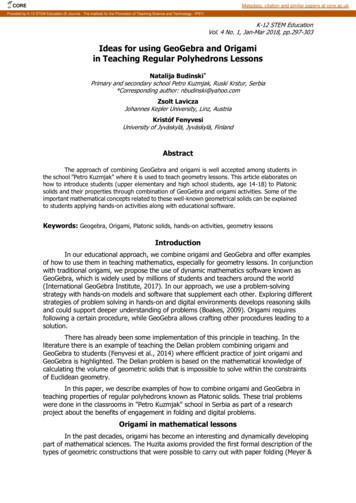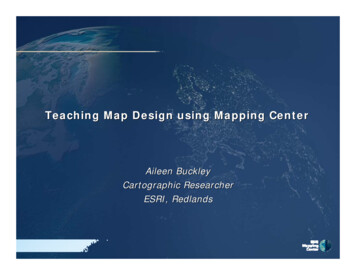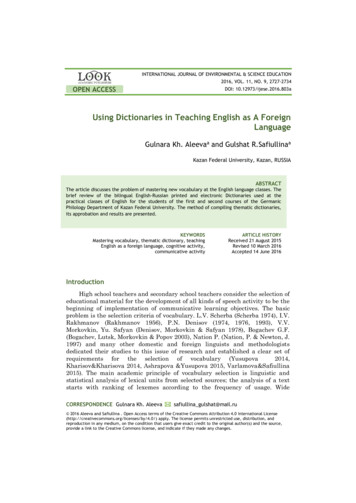
Transcription
INTERNATIONAL JOURNAL OF ENVIRONMENTAL & SCIENCE EDUCATION2016, VOL. 11, NO. 9, 2727-2734OPEN ACCESSDOI: 10.12973/ijese.2016.803aUsing Dictionaries in Teaching English as A ForeignLanguageGulnara Kh. Aleevaa and Gulshat R.SafiullinaaKazan Federal University, Kazan, RUSSIAABSTRACTThe article discusses the problem of mastering new vocabulary at the English language classes. Thebrief review of the bilingual English-Russian printed and electronic Dictionaries used at thepractical classes of English for the students of the first and second courses of the GermanicPhilology Department of Kazan Federal University. The method of compiling thematic dictionaries,its approbation and results are presented.KEYWORDSMastering vocabulary, thematic dictionary, teachingEnglish as a foreign language, cognitive activity,communicative activityARTICLE HISTORYReceived 21 August 2015Revised 10 March 2016Accepted 14 June 2016IntroductionHigh school teachers and secondary school teachers consider the selection ofeducational material for the development of all kinds of speech activity to be thebeginning of implementation of communicative learning objectives. The basicproblem is the selection criteria of vocabulary. L.V. Scherba (Scherba 1974), I.V.Rakhmanov (Rakhmanov 1956), P.N. Denisov (1974, 1976, 1993), V.V.Morkovkin, Yu. Safyan (Denisov, Morkovkin & Safyan 1978), Bogachev G.F.(Bogachev, Lutsk, Morkovkin & Popov 2003), Nation P. (Nation, P. & Newton, J.1997) and many other domestic and foreign linguists and methodologistsdedicated their studies to this issue of research and established a clear set ofrequirements for the selection of vocabulary (Yusupova2014,Kharisov&Kharisova 2014, Ashrapova &Yusupova 2015, Varlamova&Safiullina2015). The main academic principle of vocabulary selection is linguistic andstatistical analysis of lexical units from selected sources; the analysis of a textstarts with ranking of lexemes according to the frequency of usage. WideCORRESPONDENCE Gulnara Kh. Aleevasafiullina gulshat@mail.ru 2016 Aleeva and Safiullina . Open Access terms of the Creative Commons Attribution 4.0 International /) apply. The license permits unrestricted use, distribution, andreproduction in any medium, on the condition that users give exact credit to the original author(s) and the source,provide a link to the Creative Commons license, and indicate if they made any changes.
2728G. Kh. ALEEVA ET AL.application of dictionaries contributes to the effectiveness of foreign languageteaching. Intensification and improvement of the quality of foreign languageteaching require not only basic or innovative technologies, but also theavailability of the primary database language. Linguistic teaching manualscomprise textbooks, work books, tests, teacher s book, but all of them are basedon the primary and most important element of the framework - dictionaries,specialized and customized for the needs of the pupils/- students. The followingdictionaries are used by the teachers and students at the practical classes of theEnglish language: the New large English-Russian Dictionary by Apresyan Yu.D(Apresyan 2002) in three volumes comprised of 250 thousands entries; therevised edition of the large English-Russian Dictionary by Muller V.K. (Muller1995) consisting of 66 thousands entries; among the e-dictionaries the preferenceis given to the new version of Andrey Pominov s ABBYY Lingvo 12, thatincludes 6 mil. entries on 6 European languages (www.lingvo.ru), and Multitran,that is an automatic online dictionary, one of the fullest part of which is EnglishRussian part (www.multitran.ru). Lexicographical sources supply the mainreading material; provide the user with multiple meanings of the word understudy. Thus, a careful selection of vocabulary minimum serves as an importantprerequisite for efficient learning. Thematic dictionaries material is necessaryfor the expression of an idea or a concept. It is necessary to emphasize the factthat the thematic dictionaries can be included in the frame of dictionary forlearners, as, for example, the English-Tatar dictionary for learners (Safiullina2014) contains terms and lexical units of 62 terminological systems in additionto the spoken language vocabulary.MethodsThe first stage of mastering vocabulary is provided by learning ofthematically organized lexical units, while the core language picture of the worldof the foreign language culture is set in the minds of the students. To form themotivation and to affect language learning it is necessary to have a specific set oftools for language study or, namely, a bilingual dictionary for learners. With thehelp of this tool a student is able to accomplish difficult tasks. Process of wordslearning and transmission from passive vocabulary into active vocabulary isfacilitated with the dictionary. Tasks based on dictionary usage can beperformed not only individually, but also in pairs, or in groups, thereby the newmaterial is reinforced. (Meara 1983, 1987)The methodological basis of our research is provided by the systematicanalysis of printed and electronic bilingual English-Russian dictionaries that areused by teacher of the first and second courses of the Germanic PhilologyDepartment of Institute of Philology and Intercultural Communication of KazanFederal University. The aforementioned analysis is accompanied by statisticalanalysis of the dictionary use, systematization of the use of lexicographicsources, general analysis of the dictionary use technique by learners,approbation of a new method of enhancement of students command of new lexis– creation of a thematic vocabulary on their own or under the supervision of theteacher and application of the new method in increasing the level of motivationof students for learning English as a foreign language in groups andindividually.Experiment
INTERNATIONAL JOURNAL OF ENVIRONMENTAL & SCIENCE EDUCATION2729The approbation of the method of generating a thematic vocabulary andforming it up in a dictionary of the group of students finished in high increase ofthe interest of the learners to the process of study, effective mastering of lexisand new thematic vocabulary, parallel to the process of lexeme enrichment thegrammar rules and forms were learnt, as every dictionary entry is supposed toinclude basic grammar characteristics, such as morphemic and functional. Thetask was to compile a thematic dictionary on the material of the unit in writing.The task was individual and was for homework. In class students had anopportunity to compare their results, to discuss them and unite in a groupdictionary, joining their efforts. Depending on the learning objectives, tasksgiven by a teacher can vary. Speaking about the topics of the dictionary, theycan comprise wider and narrower concepts and notions of the general themes,such as:- Relationship;- Communication;- Work;- Emotions and feelings;Students of the first and second courses would necessarily have to polishtheir knowledge of the English as a foreign language on the following broadthematic areas: 1. Person; 2. Society; 3. Work, employment; 4. Leisure time,hobbies; 4. Foreign countries, travelling; 5. Environment, etc. depending on thelevel of the group and requirements of the program. (Spirina 2014)The dictionaries created through joint efforts of the student and the teacherin the form of communicative and informative activity can follow the example ofthe existing specialized thematic dictionariesThe compilation activity increases cognitive activity of the learners anddevelops their mental abilities.The process of working on the English-Tatar dictionary for learners usuallyinvolves the following steps:1) determination of the structure of the dictionary;2) determination of the volume of the dictionary;3) selection of word units;4) drawing up a list of frequency;5) the location of the most frequent translations words in order.The selection of units is conducted in accordance with the objectives oflearning, taking into account the following criteria:a) lexical units belonging to the definite branch of knowledge;b) their frequency;c) word-formation ability.Ignorance of grammar characteristics of words leads to a wrongunderstanding of the text a large percentage of errors. That is why in theEnglish-Tatar dictionary for learners the grammatical characteristics of alexeme is given after each of the word, as a second part of the dictionary entry. Itis necessary to focus students' attention on the semantic and causes of asentence. Sometimes complex relationships between the elements of semantictext cause difficulty for students. The words as still, conversely, while, however,
2730G. Kh. ALEEVA ET AL.thus, furthermore, as a result, to be more precise, and others are included withinthe text of the English-Tatar dictionary for learners. They express differentlogical relationships within the text: explanation, clarification, comparison, theexpansion of the concept, the opposition, summing up. Thus a user is enabled tobuild a complete statement and to perform the correct translation (Arslanova2003, Ayupova 2014).The major principle of compiling the ET dictionary bulk is sufficiency of theword stock. This principle is enriched by the principle of communicative valueand compatibility. Thus, the ET dictionary makes possible the communicativeform of learning. The prior step, though, is the recognition and understanding ofthe meaning of the word. Thus, the "passive" vocabulary of the learner becomes"active". The thematic dictionary can be compiled by students and teachers inclass, this activity will contribute to communicative and cognitive activity of alearner. In the course of work with the ET dictionary the use of the lexis isoptimized and the memorization of vocabulary is enhanced.Dictionary Use Skills: Instruction and PracticeDictionary minimum can significantly save time necessary for looking upthe word and optimize the process of reading and writing texts on one s own.One of the advantages of bilingual English-Russian or English-TatarDictionaries (ERD or ETD) for learners is close connection with the educationalprocess. Dictionaries of this type offer the units that are to be mastered at acertain stage of learning. Students following their progress, recognize itseffectiveness, and are motivated for better results of their work.The ERD or ETD for learners make a simple tool for individual work, asthey fill the gaps of knowledge of students. Individual work creates a morestable motivation in the process of mastering new knowledge and consolidatingthe original lexis database. Contemporary studies on methods of teaching makean accent on organization of individual work of students, as it indicates certainmental characteristics of a personality. Work with the dictionary is largely aconstituent element of independent work of students. One of the tasks of theteacher is to show the students to use and work with a bilingual dictionary todevelop the learning ability of a student. The following operations are to bedemonstrated and practiced under the supervision of a teacher: search for wordsin alphabetical order; plural form of nouns; meanings of ambiguous words;same-rooted words; conversed words; collocations; idioms, etc. Thisaforementioned list shows what an important role in the study of foreignlanguage skills is the creation and usage of the ERD or ETD for learners,especially in cross-cultural communication (Gilazetdinova 2014).At the contemporary stage of teaching English as a foreign language at thepreference is given to printed versions of dictionaries as it reassures that theuser knows the alphabet, has an idea about the structure of the dictionary.Working with traditional printed form dictionary requires concentration andlogical thinking. Translation made with the help of a printed bilingualdictionary is neither downloaded, nor copied, it a product of intellectual labor ofthe author. Therefore, for the secondary school students it is recommended touse a paper dictionary.An important role in the development of speech and vocabulary is played byliterature. The expansion of the vocabulary of the students can be achieved
INTERNATIONAL JOURNAL OF ENVIRONMENTAL & SCIENCE EDUCATION2731through reading pieces of fiction presented in textbooks, or selected by a teacher.Fiction opens the world of human emotions, to the inner world of the character.By learning to through empathy with the characters students recognize andwiden their understanding of moral values. Artistic form helps students tounderstand the beauty of foreign literary, for instance, the rhythm ofShakespeare's sonnets, the sonnet number 66, Hamlet's soliloquy, etc., andforms good taste in fiction.Excessive moralizing of characters can turn students off literature; theymust be given the opportunity of reading fiction and translating it using theERD or ETD.Education through language of art implies language competence of thelearner and skills of using dictionaries. Summarizing the above, we can concludethat to achieve this challenging goal as mastering a foreign language it isnecessary to use all means available to students; in particular, books, printedand electronic dictionaries. Their combined use and assistance of a teacher willhelp students to achieve their objectives.Electronic dictionaries versus printed dictionariesThe practical issues of creation of the bilingual Dictionary are based on theaforementioned theoretical issues.Teaching English as a foreign language has to deal with the impact ofelectronic dictionaries on the process of study, and learners tend to apply themmore often than printed versions. The operation on electronic equipment oraccess to the internet causes no difficulties for young generation of students.(Kamenskaya 2000).Is it necessary to abandon the traditional printed dictionaries, and turn toelectronic ones? The answer is unequivocal: no. Each version of the dictionaryhas its pro
The process of working on the English-Tatar dictionary for learners usually involves the following steps: 1) determination of the structure of the dictionary; 2) determination of the volume of the dictionary; 3) selection of word units; 4) drawing up a list of frequency; 5)
